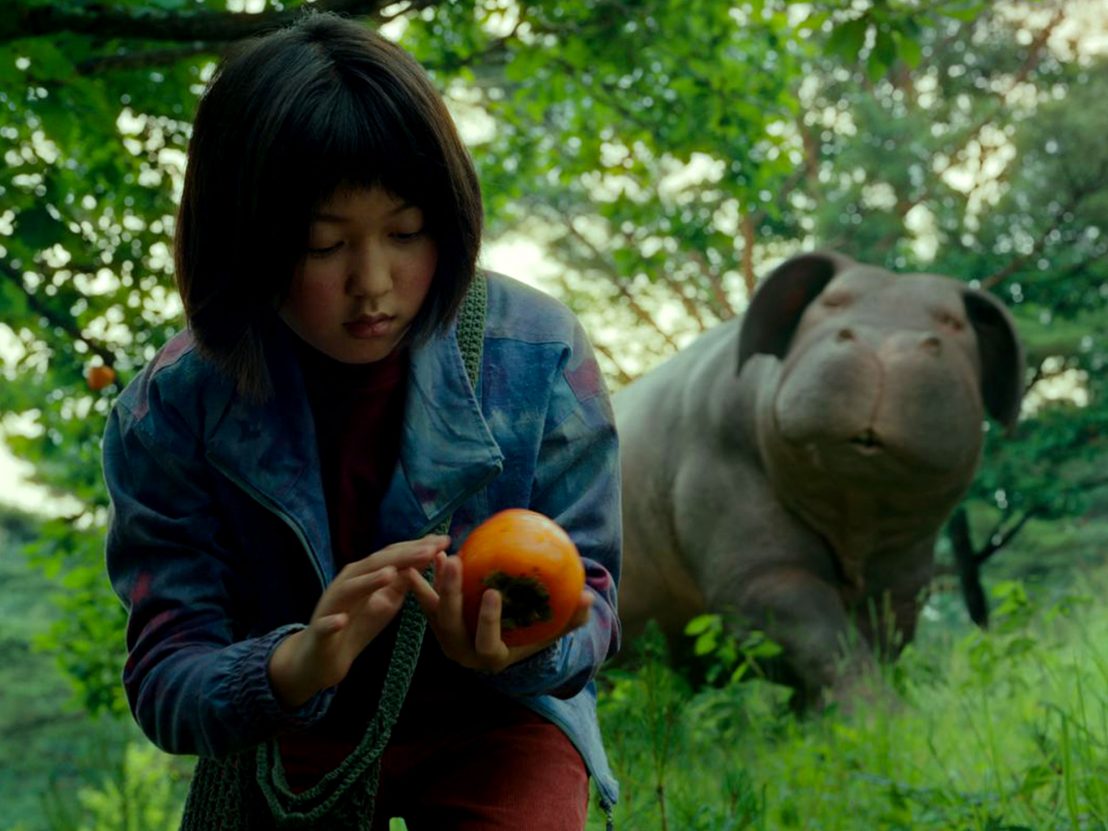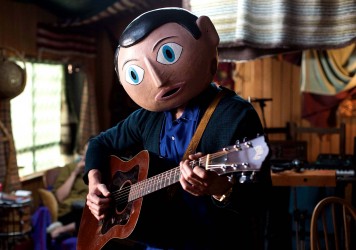
Jon Ronson isn’t interested in your eating habits. As a self-confessed “fish-and-chipocrite” – a fair weather veggie who’s been known to enjoy the occasional fish supper – the author and sometime screenwriter says he’s “never been interested in pushing vegetarianism on anyone.” But as the co-writer of Okja, Ronson hopes that many of us won’t be able to look at a sausage in quite the same way again.
A cuddly creature-feature with claws – think E.T. for woke kids – from South Korean director Bong Joon-ho, Okja tells the story of a genetically modified ‘superpig’ and the young girl who goes up against a powerful multinational to save him.
Will it persuade people to reconsider their eating habits? Ronson would prefer us to think of it more simply as an adventure story. “When you start talking about themes the danger is that people start thinking it’s an issue movie,” he tells LWLies ahead of the film’s recent UK premiere at the Edinburgh International Film Festival. “Whereas I see Okja more like Spirited Away; it’s a magical fable. Saying that, I do think it will turn people vegetarian – but that was never our intention.”
In a recent piece for the Guardian, the eminent British satirist Jonathan Coe claimed that the absurdity of the present moment calls for a satire that goes all the way up to 11 – a “rough and ready, cartoonish shortcut to the truth,” as he put it. His comments were echoed by Tilda Swinton, who plays narcissistic CEO Lucy Mirando in Okja: “I think there’s something very powerful in a time like ours, about a satire broad and extreme enough to go beyond the bounds of our worst fears.”
“The world is running out of food and we’re not talking about it,” Swinton’s Mirando in a press conference announcing the superpig project, sounding like a Buzzfeed headline generator come to life. “Our superpigs will not only be big and beautiful, they will also leave a minimal footprint on the environment, consume less feed, and produce less excretions. And most importantly, they need to taste fucking good.”
A smiling avatar of ‘caring’ corporate culture to rank with The Simpsons’ Hank Scorpio, Swinton nonetheless brings a kind of brittle desperation to the character, who is obsessed with ‘detoxifying’ the brand her father created. “Tilda mentioned early on there’s two types of business person,” says Ronson, who worked closely with Swinton to develop her character. “There are the ones who are really unreconstructed about what they do – you know, like, ‘We’re business people, we do deals and it doesn’t really matter about ethics.’ Then there’s the (Mirando) type who is more Tony Blair-like, trying to put on this social justice-y, caring veneer.”
Ronson also helped produce the film’s ingenious teaser campaign, including a mocked-up ad for Mirando Corp that sees Swinton cooing corporate platitudes over the sort of plinking indie fanfare that’s become the go-to soundtrack for every faceless conglomerate looking to give their brand a folksy makeover. “Tilda emailed me with a link to a piece,” Ronson recalls, “which said that advertisers in America are no longer interested in pleasing some middle-American family in Illinois, now they want to please millennials in Brooklyn. And that’s a real change, right? That’s about how corporations are trying to utilise social justice tropes to sell their products. So it’s nice to see that this story that we created a few years ago is getting recognised as a very real thing.”
But Okja’s satire doesn’t only extend to its virtue-signalling villains. The film also features a band of apologetic animal rights activists, led by Paul Dano, whose high-minded conceit gets some of the biggest laughs in the film. Ronson remembers writing one scene where members of the group enter into a long-winded debate about the ethics of food consumption, only to have Joon-ho distil it to one brilliant line where an anaemic-looking activist refuses to eat a tomato because “all food production is exploitative”.
Ironically, Okja’s self-deprecating streak may be one of its biggest strengths as an argument for the merits of meat-avoiding. It’s a trait the film shares with another recent satire, Simon Amstell’s Carnage, a one-off special made for the BBC. Shot in a mockumentary style, Amstell’s film envisions an all-vegan future where people are appalled to learn about their carnivorous ancestors. But, rather than using the premise to wag an accusing finger at meat-eaters, Carnage delivers disarming lines like, “Why do you keep making me ejaculate?”, as delivered by Joanna Lumley playing a talking goat.
“Someone said it was a sci-fi vegan comedy and I just thought it sounded awful,” Amstell joked during an on-stage interview at London’s BFI back in March. “It just had to be funny, because otherwise the whole thing would stink.” The problem, he added, was one of perception – whenever you see or hear about veganism on-screen, it tends to be presented in a preachy fashion that rubs people up the wrong way (and besides, you could argue well-meaning docs like Earthlings and Speciesism risk preaching to the converted). His answer? To make it “funny enough that you didn’t mind when a new bit of info was presented, [like] when we told you that male chicks get gassed or shredded.”
Nor does Okja shrink from presenting us with some hard truths, albeit in larger-than-life fashion. Ronson stopped eating meat after a trip to an abattoir brought home the brutal realities of industrial farming methods, and he reveals that reading Bong’s first draft of the script produced a similar visceral response. “When I read the scene with the direction, ‘Interior, slaughterhouse, night’, I just couldn’t believe it,” he says. “For me it’s the key scene in the movie. I thought, ‘This is gonna be the kind of scene that people will be talking about for years to come.’ But the initial feedback Bong got from the studios was, ‘Are you gonna take that scene out?’ Then he took it to Netflix and they didn’t have that problem at all.” Delighted, the director invited Ronson to go over the script and pepper it with F-bombs.
Will Okja escape his date with the sausage factory? No prizes for guessing the outcome there, but in the end, it’s telling that Mija’s devotion to her friend outweighs the activists’ commitment to the cause – an acknowledgement that, for the vast majority of people, everyday relationships count for more than abstract ideology. It is, perhaps, this understanding that will make viewers stare long and hard at their dinner plates after the credits have rolled.
Published 29 Jun 2017

Bong Joon-ho delivers a colourful satire that questions the relationship between capitalism, food and pets.

The South Korean genre whiz behind Snowpiercer and The Host discusses his latest creature satire.

Michael Fassbender stars as the artist formally known as Frank Sidebottom in this spiky music industry satire.